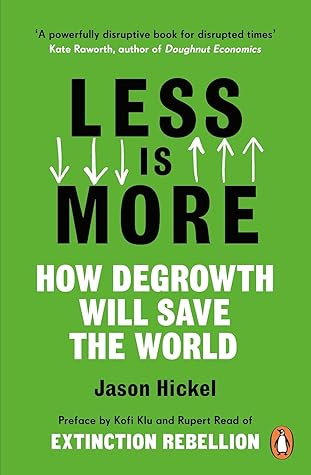More on this book
Community
Kindle Notes & Highlights
by
Jason Hickel
Read between
November 14 - November 14, 2020
Clean energy might help deal with emissions, but it does nothing to reverse deforestation, overfishing, soil depletion and mass extinction. A growth-obsessed economy powered by clean energy will still tip us into ecological disaster.
‘green growth’ is not a thing.
Scarcity – and the threat of hunger – served as the engine of capitalist growth. The scarcity was artificial in the sense that there was no actual depletion of resources: all the same land and forests and waters remained, just as they always had, but people’s access to them was suddenly restricted.
GDP growth is, ultimately, an indicator of the welfare of capitalism. That we have all come to see it as a proxy for the welfare of humans represents an extraordinary ideological coup.
All that new clean energy isn’t replacing dirty energies, it’s being added on top of them.18 This dynamic should give us pause. Yes, we need as much renewable energy as we can get – but it won’t make enough of a difference if the global economy continues to grow at existing rates.
We must choose to limit growth ourselves. We need to reorganise the economy so that it operates within planetary boundaries, to maintain the Earth’s life-supporting systems which we depend on for our existence.31
Escaping the frying pan of climate disaster doesn’t help us much if we end up hopping into the flames of ecological collapse.
impose a cap on annual resource use and waste, and tighten that cap year-on-year until we are back within planetary boundaries.
For 500 years, capitalism has depended on extraction from nature. It has always needed an ‘outside’, external to itself, from which to plunder value, for free, without an equivalent return. That’s what fuels growth.
What explains the remarkable results that these countries have achieved? It’s simple: they’ve all invested in building high-quality universal healthcare and education systems.
In fact, nations can succeed on a wide range of key social indicators – not just health and education, but also employment, nutrition, social support, democracy and life satisfaction – with as little as $10,000 per capita, while staying within or near planetary boundaries.
countries that have robust welfare systems have the highest levels of human happiness, when controlling for other factors. And the more generous and universal the welfare system, the happier everyone becomes.
People feel they have meaningful lives when they have the opportunity to express compassion, co-operation, community and human connection.
We know exactly what works: reduce inequality, invest in universal public goods, and distribute income and opportunity more fairly.
Justice is the antidote to the growth imperative – and key to solving the climate crisis.
organise the economy around the needs of humans and ecology, rather than the other way around.
It is about reducing the material and energy throughput of the economy to bring it back into balance with the living world, while distributing income and resources more fairly, liberating people from needless work, and investing in the public goods that people need to thrive.
An economy that’s organised around human flourishing and ecological stability, rather than around the constant accumulation of capital.
Sam Pizzigati, an associate fellow at the Institute for Policy Studies, argues that we should cap the after-tax wage ratio at 10 to 1.
The commons become an antidote to the growth imperative.
Suddenly a new paradox emerges: abundance is revealed to be the antidote to growth.
shamans also mediate between the human community and the broader community of beings on which humans depend.
Scientists estimate that 80% of the planet’s biodiversity is to be found on territories stewarded by Indigenous peoples.
Descartes’ ideas had no grounding in empirical evidence, but they became popular among European elites in the 1600s because they bolstered the power of the Church, justified the capitalist exploitation of labour and nature, and gave moral licence to colonisation.
fact, the world that presents itself to us is co-created by other subjects, just as we co-create their world.
This is what Indigenous philosophers teach us: that we must learn to see ourselves once again as part of a broader community of living beings. If our approach to degrowth does not have this ethic at its heart, then we have missed the point.
Plants sense: they see, hear, feel and smell, and they respond accordingly.
Predation turns out to be more about balance and equilibrium than anything else.
Remember, for the Achuar and Chewong, the key principle is reciprocity. You have to start by recognising that you are in a relationship of interdependence.
All of this runs exactly against the logic of capitalism. Capitalism ultimately relies on a single, overarching principle: take more than you give back. We’ve seen this logic in action for 500 years, beginning with enclosure and colonisation. In order to accumulate surplus, you have to extract uncompensated value from nature and bodies, which must be objectified and rendered as ‘external’.


